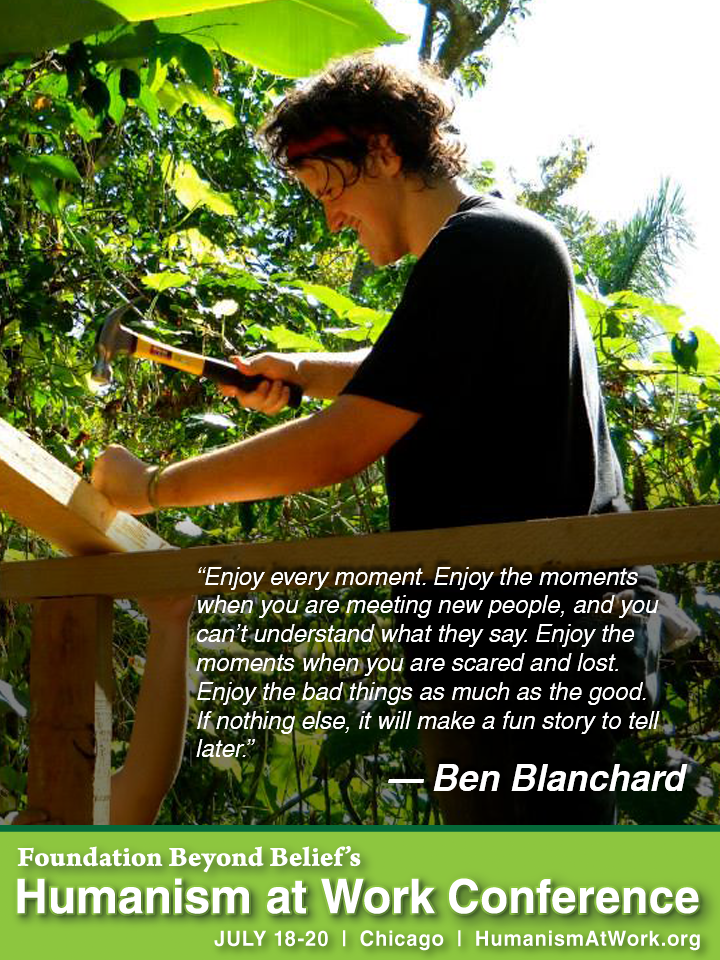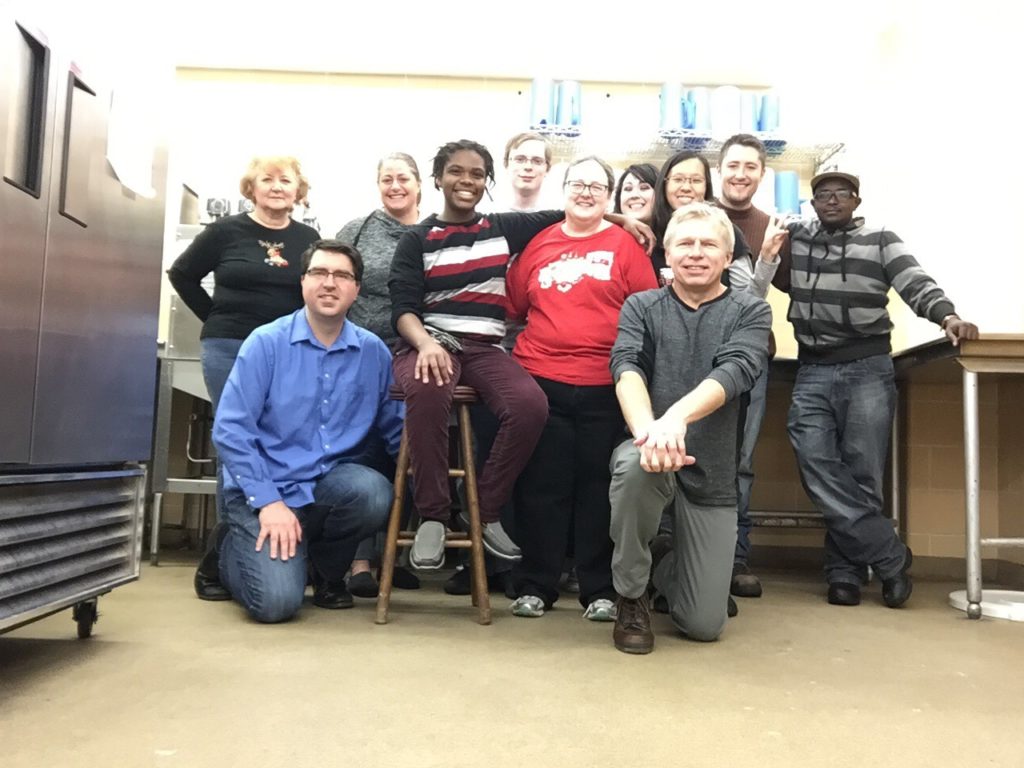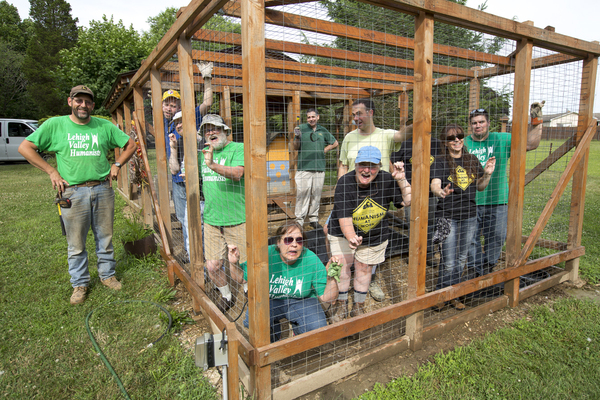Search results for: atheism
“I want to be FOR something”—David Smalley, Dogma Debate
David Smalley will speak and record his popular podcast at FBB’s Humanism at Work conference, July 18-20. Even though he grew up in the small Texas town of Everman, the son of a single Christian mother, David Smalley was never forced to attend church. He was eventually baptized and ironically credits that event with the…
Read MoreBeyond Belief Network Teams improve selves and community
Foundation Beyond Belief’s Beyond Belief Network is a network of secular humanist groups volunteering in their communities and raising money for FBB’s featured charities and programs. Any group with a public secular humanist or atheist identity is welcome to join, regardless of experience or group size. Four members of our Team of the Month for June…
Read More“Fun, hard, rewarding, infuriating, and worth it”—Nicole Steeves, Sunday Assembly
Nicole Steeves was born and raised Pentecostal outside of Flint, Michigan. She stopped believing around 4th grade after what she calls “a lame week at church camp” (when she learned of her church’s anti-abortion position), then relapsed just in time for her 9th grade baptism in the cross-shaped pool at her family’s megachurch. It didn’t…
Read More“The ultimate expression of humanism”: Ben Blanchard, Pathfinders Project
Ben Blanchard took some time out of his work with impoverished families in Guatemala City to reflect on his year of humanist service currently underway with Pathfinders Project. No one who knows Ben Blanchard would be surprised to find him working among disenfranchised families in Guatemala. Service and activism have featured prominently in Ben’s life…
Read MoreBBN teams take the lead in spring community service events
Foundation Beyond Belief’s Beyond Belief Network is a network of secular humanist groups volunteering in their communities and raising money for FBB’s featured charities and programs. Any group with a public secular humanist or atheist identity is welcome to join, regardless of experience or group size. Three volunteers from Austin Atheists Helping the Homeless were invited…
Read MoreMilitary Religious Freedom Foundation
The Military Association of Atheists & Freethinkers (MAAF) builds community for atheists and humanists in the military. MAAF connects military members from around the world with each other and with local organizations. In addition to our community services, MAAF takes action to educate and train both the military and civilian community about atheism in the…
Read MoreMinnesota Atheists
Minnesota Atheists is Minnesota’s oldest and largest atheist organization. We are a 501(c)(3) non-profit, educational organization that seeks to promote the positive contributions of atheism to society and to maintain separation of state and church. We produce a weekly live radio show and podcast, “Atheists Talk”. We offer speakers to the community free of charge.…
Read MoreLehigh Valley Humanists
Lehigh Valley Humanists is a chapter of the American Humanist Association. As secular humanists, we strive to bring about a progressive society where being good without a god is an accepted way to live life. Humanism encompasses a variety of nontheistic views (atheism, agnosticism, rationalism, naturalism, secularism, and so forth) while adding the important element…
Read MoreBBN teams spring into action
By Elizabeth Minutello, Beyond Belief Network intern
Foundation Beyond Belief’s Beyond Belief Network is a network of secular humanist groups volunteering in their communities and raising money for FBB’s featured charities and programs. Any group with a public secular humanist or atheist identity is welcome to join, regardless of experience or group size. In March, BBN’s community service theme is Community Gardens.

The Humanist Community at Harvard recently organized an event called, “Faces of Homelessness: Cards and Scarves.” HCH welcomed representatives from the Massachusetts Housing and Shelter Alliance and the Massachusetts Faces of Homelessness Speakers’ Bureau to share their experiences with being homeless and to break down stereotypes. Following the speakers, HCH members made 256 fleece scarves and wrote encouraging cards for the homeless. HCH also hosted a winter clothing drive for people to donate items to the Friends of Boston’s Homeless.
Humanist Community of Central Ohio supported one of their members when she was facing a crisis. After struggling with her finances and health, this member set up an online funding page. HCCO shared the link among their membership. Although most of the donors were anonymous, some funds were donated by members of HCCO and another BBN team, Central Ohio United Non-Theists (COUNT). The member needed $2,910 to cover six months of back rent. In six days, she raised $3,600. She continues to receive additional support from community members. HCCO also hosted a Bleed & Feed (group blood donation and dinner) event. They had eight successful blood donors at the Red Cross Donor Center. They also had non-bleeding volunteers offer moral support and encouragement. This event was covered in the Columbus Dispatch and a mention on Friendly Atheist.
Austin Atheists Helping the Homeless continued their team’s monthly service event. They collected and distributed books, snacks, clothing, and accessories to 65 members of Austin’s homeless community.


Upstate Atheists met at the Greer Soup Kitchen to serve the underprivileged. When they arrived, the prepared meals were still frozen. None of the staff on hand knew how to cook. Luckily, a culinary-minded member of Upstate Atheists planned a meal and delegated tasks. She helped to make enough food to feed 150 people in less than an hour! Upstate Atheists have been invited by Greer Soup Kitchen to return for a future volunteer opportunity. Upstate Atheists also had their first Adopt-A-Highway Clean Up in Greenville, SC. Although only two members were available to clean both sides of their new two-mile stretch of road, they collected four bags of trash.



If you are a member of a secular humanist or atheist group and would like to participate in community service projects under the national umbrella of Foundation Beyond Belief, join Beyond Belief Network. We welcome all atheist groups interested in service, from groups with extensive volunteer experience to newly formed groups new to secular service. By aggregating our efforts, we demonstrate that all we really need is charity and goodness to make the world a better place.
Social psychology of groups: How can we get nonbelievers to join our groups?
 Brittany Shoots-Reinhard has a PhD in social psychology with a specialization in attitudes and persuasion, and judgment and decision making. She is also Foundation Beyond Belief’s Beyond Belief Network coordinator.
Brittany Shoots-Reinhard has a PhD in social psychology with a specialization in attitudes and persuasion, and judgment and decision making. She is also Foundation Beyond Belief’s Beyond Belief Network coordinator.
While there is no doubt that the Internet is one of the best tools of the secular movement, it does have a downside in that local communities might be neglected as atheists interact with each other online. One of the challenges we face as a movement is getting people involved in service, activism, and community-building in real life. This is easy for religious groups, which require or encourage attendance at weekly services, but more difficult for atheists, particularly with resistance to “churchiness” and organization. In addition to making atheism more visible and acceptable, having a tribe has some psychological benefits for individuals, too. Keeping these in mind can both grow our movement at the grassroots level and minimize the happiness gap between believers and nonbelievers.
 Humans appear to have a need to belong, or a fundamental motivation to have some minimum level of friendship in their lives (e.g., Baumeister & Leary, 1995). Forming quality bonds produces positive emotions; a lack of them is associated with depression, loneliness, and lowered well-being. Even the threat of loss of close relationships will produce anxiety (e.g., Leary, 1990). Inadequate support can lead to health problems. Janice Kiecolt-Glaser and her husband have a program of research on the effects of stress and relationships on health. Not meeting our need to belong depresses the immune system and exacerbates stress (e.g., Kiecolt-Glaser & Glaser, 1987; Kiecolt-Glaser, Garner, et al., 1984). Social interaction and support is a likely explanation for the link between happiness and religiosity, so local groups serve a very important function in the well-being of their members.
Humans appear to have a need to belong, or a fundamental motivation to have some minimum level of friendship in their lives (e.g., Baumeister & Leary, 1995). Forming quality bonds produces positive emotions; a lack of them is associated with depression, loneliness, and lowered well-being. Even the threat of loss of close relationships will produce anxiety (e.g., Leary, 1990). Inadequate support can lead to health problems. Janice Kiecolt-Glaser and her husband have a program of research on the effects of stress and relationships on health. Not meeting our need to belong depresses the immune system and exacerbates stress (e.g., Kiecolt-Glaser & Glaser, 1987; Kiecolt-Glaser, Garner, et al., 1984). Social interaction and support is a likely explanation for the link between happiness and religiosity, so local groups serve a very important function in the well-being of their members.
This is not to say that one must go to a weekly meeting of atheists to be happy. Like any motivation, our need to belong can be met in a variety of ways. It can be satisfied by one or two good friends, a work or social group, family, or even a larger group. Numbers of friends are not nearly as important as relationship stability, supportiveness, mutual concern, and opportunities for interaction (Baumeister & Leary, 1995). As a result of the substitutability of relationships, other factors have to be considered when predicting what type of groups we might join.
When people are choosing groups (or groups are recruiting members), they focus on mutual goals (e.g., Moreland & Levine, 1982). Those of us who belong to humanist, atheist, or skeptic groups have goals in common with those groups. The goals of various groups may or may not overlap, which can be seen in a lot of the debate over inclusion or exclusion of various topics at secular conferences. The narrowing of focus is actually a sign of increased involvement as groups tailor their goals to their groups and new groups form. The groups that people are involved in can hint at their goals. For example, groups that are members of Foundation Beyond Belief’s Beyond Belief Network or Humanist Giving programs are signaling that community service and charity are among their goals.
In addition to goals, people also consider whether they are similar to other members in other ways. People are more likely to identify with (and participate in) a group whose members are similar to them. Over time, this often results in homogeneity (Hogg & Hains, 1996) in terms of race or gender. Without realizing it, groups may be unwelcoming to minority groups because of the lack of diversity in their membership (in this context I mean minority relative to the group, so men could feel unwelcome in a parents group, although atheism as a movement has tended to have white men as the majority). From the group’s perspective, they are not doing anything to discourage minorities, but the minorities assume that they do not belong. Thus, the only way to achieve diversity is to make it a priority (Jehn, Northcraft & Neale, 1999). It will not happen on its own; in fact, it’s more likely for a group to become less diverse over time (Hogg & Hains, 1996). So groups like Black Nonbelievers and Secular Woman serve an important purpose in bridging the gap between nonbelievers and the larger atheist movement. Similarly, making diversity of speakers a priority is likely to increase attendance at meetings and conferences.
To attract new members to our groups, then, we need to be cognizant of our goals and how well we’re communicating them. Considering the perceptions of potential members is also important. A pub meetup with an active community service schedule might need to emphasize that in their description because it’s less expected. A group with a Facebook page with lots of anti-religious jokes should not be surprised if they struggle with interfaith partnerships. A group of mainly men who want to get more women involved might invite some women to speak and publicize their anti-harassment policy. It may make sense in some cases to start subgroups for certain types of activities or demographics to attract unaffiliated nonbelievers. Anecdotally, many people I’ve talked to were involved in smaller special interest groups (e.g., parenting, women, racial minority, or activity based) before becoming members of larger local and national groups. So rather than being resistant to new groups or splitting into smaller groups, we should recognize the opportunity they provide for growth.
Read More



